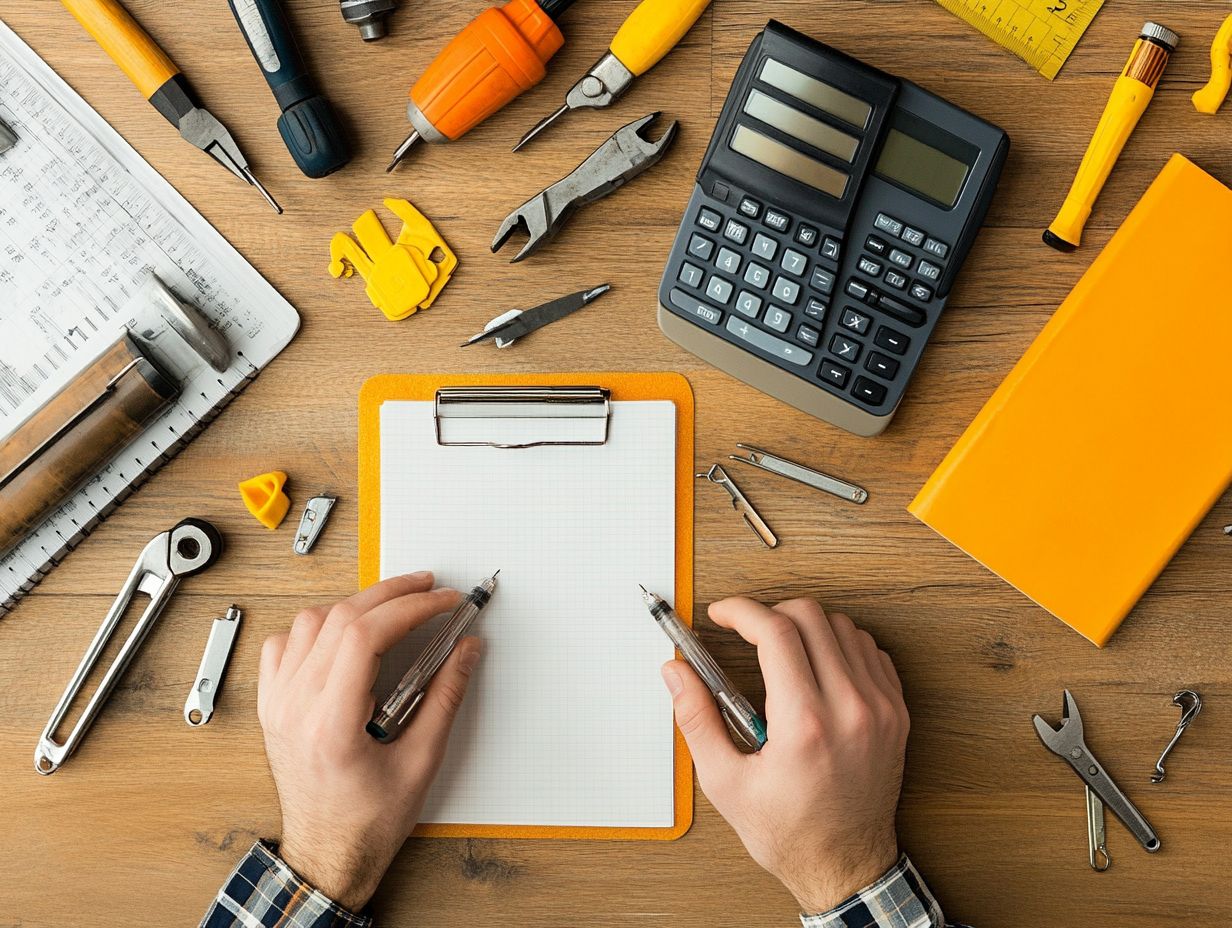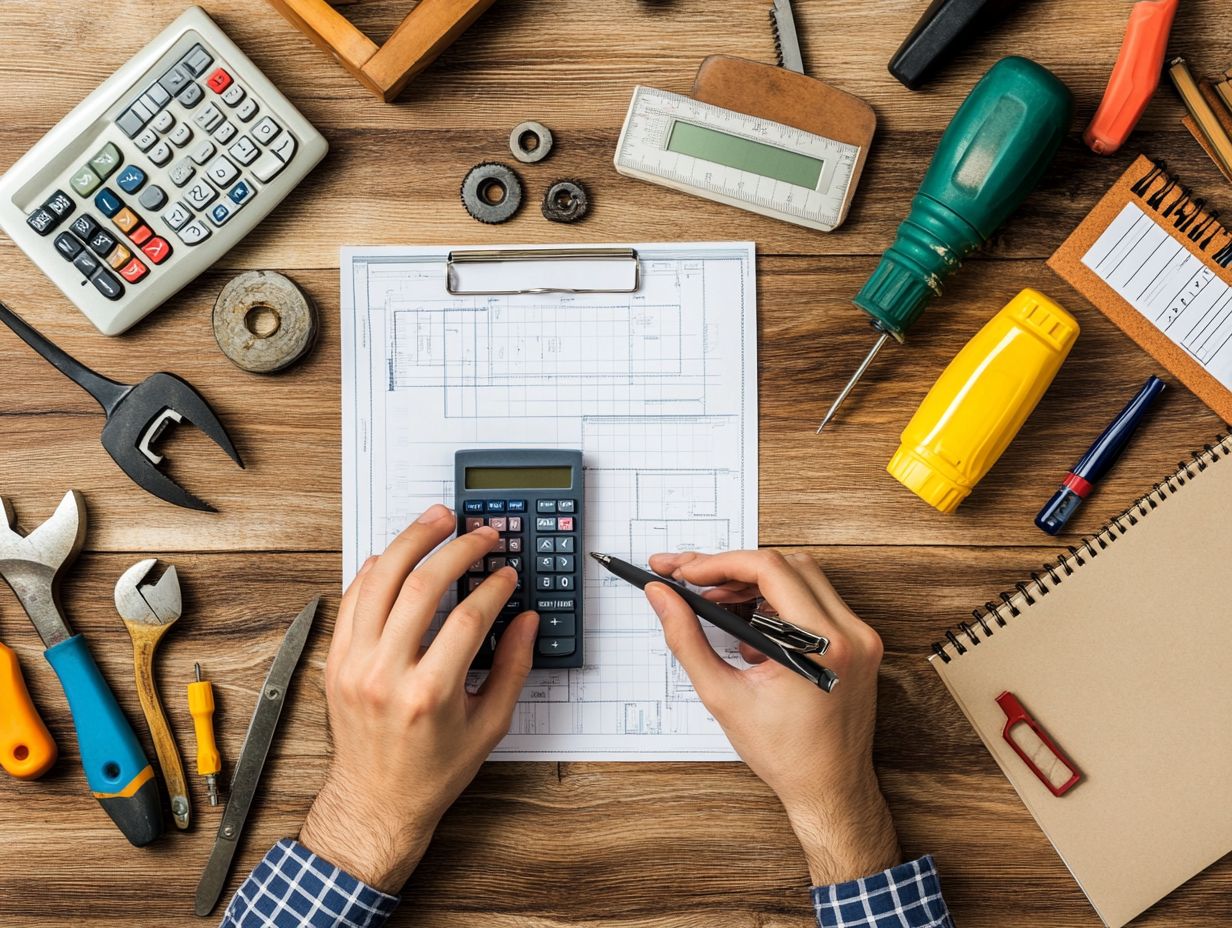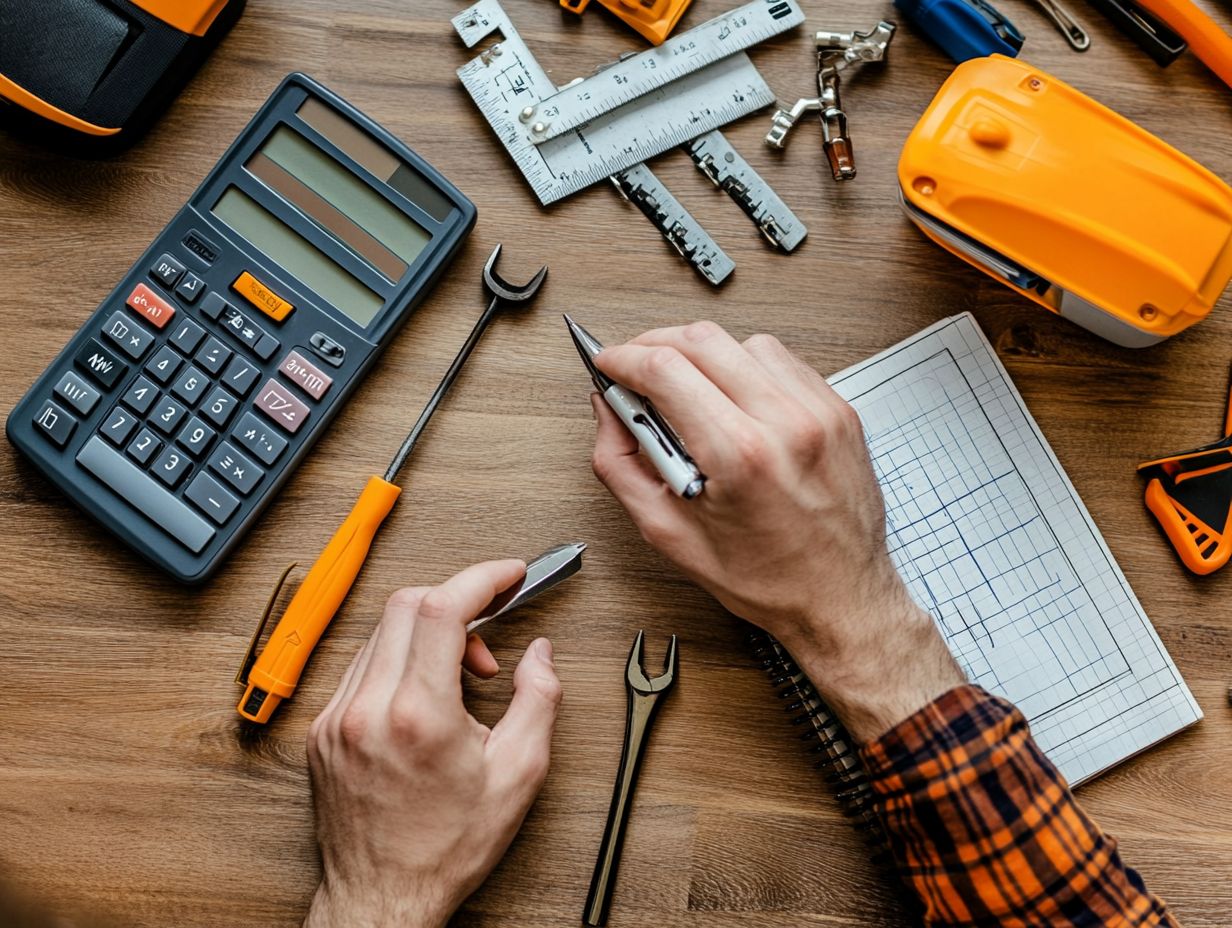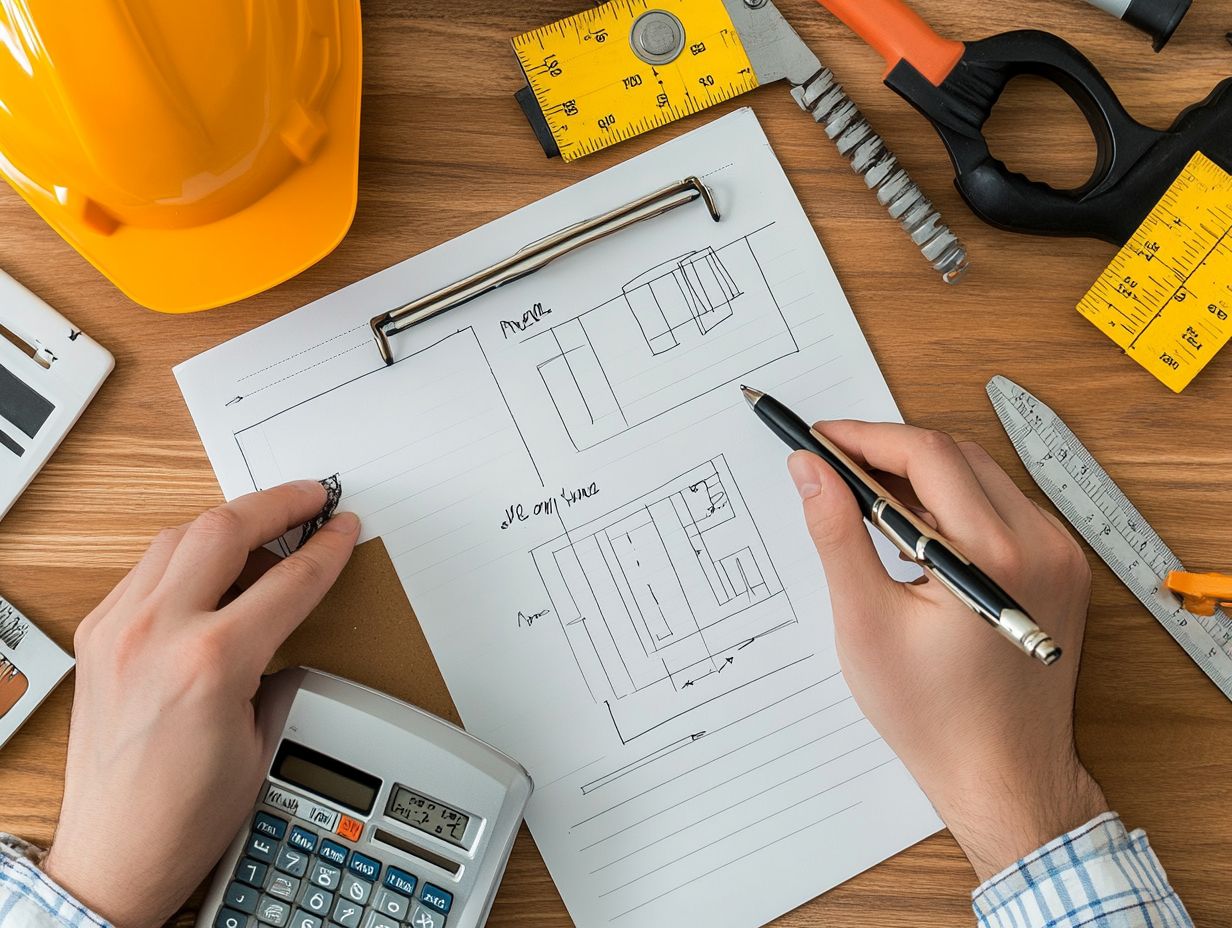How to Evaluate Common Repair Estimates
Feeling overwhelmed by repair estimates? Let’s break it down together! Understanding these estimates is crucial don’t miss out on potential savings.
Repair estimates can often seem daunting, yet grasping their intricacies is vital for making informed choices about your home projects.
This article will delve into the essentials. We will begin with an explanation of what a repair estimate is and why it’s important to evaluate it. You will also learn how to compare estimates from various contractors and what considerations to keep in mind when finalizing your decision.
Prepare to navigate the realm of repair estimates with newfound confidence!
Contents
- Key Takeaways:
- Understanding Repair Estimates
- Key Factors to Consider
- Scope of Work
- Cost Breakdown
- Timeline and Completion Date
- Comparing Estimates from Different Contractors
- Questions to Ask and Things to Look For
- Making a Decision
- Frequently Asked Questions
- What are common repair estimates and why should I evaluate them?
- How can I determine if a repair estimate is accurate?
- What should I look for when evaluating a repair estimate?
- What are some red flags to watch out for in repair estimates?
- Can I negotiate a repair estimate?
- What should I do if I am not satisfied with a repair estimate?
Key Takeaways:

- Carefully evaluate repair estimates to understand the scope of work, costs, and when the job will be done.
- Compare estimates from multiple contractors by asking questions and looking for important factors.
- Look for a contractor with experience, a good reputation, and clear communication skills.
Understanding Repair Estimates
Grasping the nuances of repair estimates is essential for any vehicle owner dealing with damage. This understanding gives you the power to make informed choices about whether to repair or replace your car following an accident.
Repair estimates not only shed light on the costs involved but also offer a glimpse into potential settlement amounts. This can be invaluable during negotiations with insurers and claims adjusters.
By ensuring that these estimates accurately reflect the true value of the necessary repairs, you position yourself for a fair outcome in the process.
What is a Repair Estimate?
A repair estimate is a comprehensive document crafted by an auto body repair shop that outlines the expected costs involved in repairing your vehicle. This includes the cost of labor and cost of parts.
This document is invaluable for both you and the repair shop, breaking down each element of the repair process in a clear manner. You’ll typically find details on parts costs, which may include original manufacturer components or parts that are not made by the original manufacturer, along with labor costs, which reflect the shop’s hourly rate multiplied by the estimated time required for the repairs.
The estimate might also include extra costs such as taxes, fees, and any extra services that could arise during the repair process. By understanding how these costs are calculated, you can make informed decisions and prepare for the financial aspects of your automotive repair needs.
Why is it Important to Evaluate Them?
Evaluating repair estimates is essential for you as an automobile owner, giving you the power to make informed decisions about whether to pursue repairs or consider replacement options, particularly when navigating insurance claims.
Accurate assessments are critical in the broader insurance process. They directly affect the financial outcomes for both you and your insurance provider.
By thoroughly reviewing repair estimates, you can gain a clearer understanding of the potential costs involved, which can significantly sway the approval or denial of your claims.
For claims adjusters, having detailed and precise estimates is vital for assessing the legitimacy of claims and ensuring fair compensation. In an industry where every dollar matters, the significance of accuracy cannot be overstated, as it ultimately influences your overall satisfaction and trust in the relationship with your insurance company.
Key Factors to Consider
When you assess repair estimates, it s essential to consider several key factors. Take into account the scope of work required and the detailed breakdown of labor costs.
Each of these elements can profoundly influence your overall expenditure.
Scope of Work

The scope of work in a repair estimate outlines the specific tasks and repairs necessary to restore your automobile to its pre-accident condition. It details exactly what the body shop will address.
This outline provides clarity about the repairs needed and fosters a sense of trust between you and the repair facility. By categorically listing the required actions, timelines, and associated costs, the scope of work serves as your roadmap for the repair process. It ensures everyone has a mutual understanding of expectations, leaving little room for ambiguity.
A well-defined scope can help you avoid disputes over additional repairs. It acts as a reference point throughout the service duration. Ultimately, this transparency enhances your satisfaction and confidence in the repair service.
Cost Breakdown
The cost breakdown in a repair estimate gives you a clear view of the various components involved, including labor costs and parts estimation, which are vital for understanding your total financial commitment.
By examining each element like diagnostic fees, shop rates, and the markup on parts you gain valuable insights into how your money is being allocated. Understanding these line items promotes transparency and equips you to compare estimates from different mechanics effectively.
This knowledge helps you avoid hidden charges and prioritize repairs based on urgency and your budget constraints. Having a thorough understanding of these costs enables you to make informed decisions, ensuring that the repair process meets your vehicle’s needs and your financial situation.
Timeline and Completion Date
The timeline and completion date are important parts of repair estimates. They reveal how long the repair process is expected to take, which can directly impact your time without using your vehicle.
When your vehicle is out of commission, it s not just inconvenient. It may also have financial repercussions, especially if that vehicle is essential for your business operations. A clear timeline allows you to plan better, helping you make informed decisions about alternative transport options.
Any delays in the repair process could extend your time without using your vehicle, potentially disrupting other areas of your operations or services.
Understanding the nuances of the repair timeline can significantly shape your decision-making process, ultimately influencing your productivity and efficiency in the long run.
Comparing Estimates from Different Contractors
It’s vital for car owners to compare estimates from different contractors to secure the best value for their repair services. This process allows you to assess both the quality and cost of the work proposed by multiple auto body shops, ensuring you make an informed decision that aligns with your needs and budget.
Questions to Ask and Things to Look For
When comparing repair estimates, it s essential to ask specific questions and look for key elements in the documentation to ensure you receive fair estimates.
Addressing factors such as the type of repairs needed, parts versus labor costs, and warranty terms will provide you with a clearer understanding of the estimates’ validity. Inquire about the certification of the technicians performing the work and whether the shop offers guarantees on both parts and services. It s also wise to verify if the estimates are comprehensive, detailing all required repairs, or if they overlook critical aspects.
Ultimately, a thorough evaluation of these components gives you the power to make informed decisions, protecting both your vehicle and your finances.
Making a Decision

Deciding on repair estimates requires careful evaluation of several key factors. Consider the contractor’s reputation and the terms you negotiate to ensure you achieve a cost-effective and satisfactory outcome.
Your diligence in this process will greatly influence the success of your project.
Don’t delay! Understanding your repair estimate now can save you time and money later. Take charge of your repair estimate today!
Factors to Consider in Choosing a Contractor
When selecting a contractor for automobile repairs, consider key factors like their reputation, customer service, and clarity of estimates.
Examine the contractor’s experience with your vehicle make and model; this greatly influences repair quality. Check their qualifications to ensure they meet industry standards.
Reading reviews from previous customers offers valuable insights into their work ethic and reliability.
Don’t overlook the importance of transparency regarding warranties and quality parts. These details empower you to make informed choices for your automotive needs.
Negotiating and Finalizing the Contract
Negotiating and finalizing the contract with a repair contractor is essential for ensuring that all terms are crystal clear, leaving no room for unexpected charges.
This journey begins with open communication, where you and the contractor can discuss the scope of work, timelines, and potential costs candidly. Transparency in these agreements reduces misunderstandings or hidden fees.
It’s crucial to clarify each specific item listed in the estimate. Requesting detailed invoices and explicitly outlining payment terms can further safeguard your interests. By concentrating on these key elements, you can lay a strong foundation that fosters trust and maintains a positive working relationship with the contractor throughout the project.
Frequently Asked Questions
What are common repair estimates and why should I evaluate them?
Common repair estimates are cost estimates provided by professionals for repairing various items or systems. Evaluating them ensures you receive a fair price and quality work.
How can I determine if a repair estimate is accurate?

To evaluate the accuracy of a repair estimate, gather multiple estimates from different professionals and compare them. Additionally, understanding common car repair costs in your area can provide better context for your comparisons.
What should I look for when evaluating a repair estimate?
When evaluating a repair estimate, ensure it includes a detailed breakdown of the costs, including materials and labor. Check for any hidden fees or additional charges.
What are some red flags to watch out for in repair estimates?
Be cautious of repair estimates that are significantly lower than others, as this may indicate poor-quality work or the use of subpar materials. Also, watch for estimates that lack specific details or have unclear language.
Can I negotiate a repair estimate?
Yes, you can negotiate a repair estimate. Use multiple estimates to negotiate a lower price or discuss specific aspects of the repair, such as material costs or timeline adjustments.
What should I do if I am not satisfied with a repair estimate?
If you are not satisfied with a repair estimate, consider negotiating with the professional or seeking estimates from others. Ultimately, choose a repair estimate that you feel comfortable with and trust to provide quality work.






